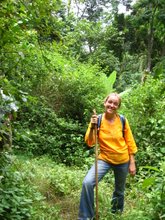
Two friends J and S arrived from the states this week within one day of each other. On Wednesday we accompanied J to Kariakoo Market, near Posta daladala stop. Called the biggest market in Tanzania, Kariakoo is also full of pickpocketers, who've attempted to get friendly with me in the past. P was not happy this time when one young man -- a supposed plastic bag merchant-- reached into his pockets when P was trying to buy some eggplants. But he elbowed the gent, and he looked at him, stupefied, without running away. Thiefs risk mob violence when caught, so P chose not to yell out. The thief didn't succeed, in any case.
As we toured the streets and shops in the hood, P and I made our usual reverent visits to used clothes and textile shops. I've heard that one of the biggest U.S. industries here is bringing used T-shirts. The packs of what look like freeze-dried t-shirts are sold by the pound. Hawkers stand on top of them, and call your attention to the treasures through some performance resembling an auctioneer's. Usually P's in the mood to tackle these mounds of fresh threads, but it was a humid day in the rainy season so we took shelter in the Kariakoo Social Club, a relaxing outside bar and club.
On Thursday, P arranged a bike tour of Dar with a company called Afriroots. It was sensational to ride a bike for the first time since last fall, and to see the cityscape in such a unique way, even if the bikeseat had no cushion and the perilously muddy terrain clogged up our wheels and spokes. Through Mejia's expert guidance, we entered some fabulous neighborhoods we have never explored by daladala or by foot. We got some weird looks; after all, Tanzanians mostly ride bikes to transport heavy loads (water, timber, iron rods); it's rare to ride on the road or on the sidewalk for leisure or commuting. In fact it's plain dangerous.
Along the way, we visited a traditional urban healer, an ujumaa village dating back to Nyerere's period, and a market near Magomeni and Kariakoo. In the market we had fresh fried donuts, spoke with children for a while, then bought some beautiful batik, the likes of which I hadn't seen before. At one point, J took a tumble as he attempted to cross a rickety bridge made of rotting planks of wood. When he veered a bit to the left of the most solid part, his foot dove, followed by the rest of him, into the garbage stench below, composed of last week's cabbage leaves, orange rinds and water bottles, topped off by cooking oil and rivulets of sewage. He scraped his shin a bit, but didn't hurt himself enough to not pick himself up, wipe off the tomato skins coating his calves and Chacos, and laugh wildly.
Tomorrow morning our visitors will reverse the downward trend and start their ascent of Mount Meru, near Arusha.
As we toured the streets and shops in the hood, P and I made our usual reverent visits to used clothes and textile shops. I've heard that one of the biggest U.S. industries here is bringing used T-shirts. The packs of what look like freeze-dried t-shirts are sold by the pound. Hawkers stand on top of them, and call your attention to the treasures through some performance resembling an auctioneer's. Usually P's in the mood to tackle these mounds of fresh threads, but it was a humid day in the rainy season so we took shelter in the Kariakoo Social Club, a relaxing outside bar and club.
On Thursday, P arranged a bike tour of Dar with a company called Afriroots. It was sensational to ride a bike for the first time since last fall, and to see the cityscape in such a unique way, even if the bikeseat had no cushion and the perilously muddy terrain clogged up our wheels and spokes. Through Mejia's expert guidance, we entered some fabulous neighborhoods we have never explored by daladala or by foot. We got some weird looks; after all, Tanzanians mostly ride bikes to transport heavy loads (water, timber, iron rods); it's rare to ride on the road or on the sidewalk for leisure or commuting. In fact it's plain dangerous.
Along the way, we visited a traditional urban healer, an ujumaa village dating back to Nyerere's period, and a market near Magomeni and Kariakoo. In the market we had fresh fried donuts, spoke with children for a while, then bought some beautiful batik, the likes of which I hadn't seen before. At one point, J took a tumble as he attempted to cross a rickety bridge made of rotting planks of wood. When he veered a bit to the left of the most solid part, his foot dove, followed by the rest of him, into the garbage stench below, composed of last week's cabbage leaves, orange rinds and water bottles, topped off by cooking oil and rivulets of sewage. He scraped his shin a bit, but didn't hurt himself enough to not pick himself up, wipe off the tomato skins coating his calves and Chacos, and laugh wildly.
Tomorrow morning our visitors will reverse the downward trend and start their ascent of Mount Meru, near Arusha.

No comments:
Post a Comment